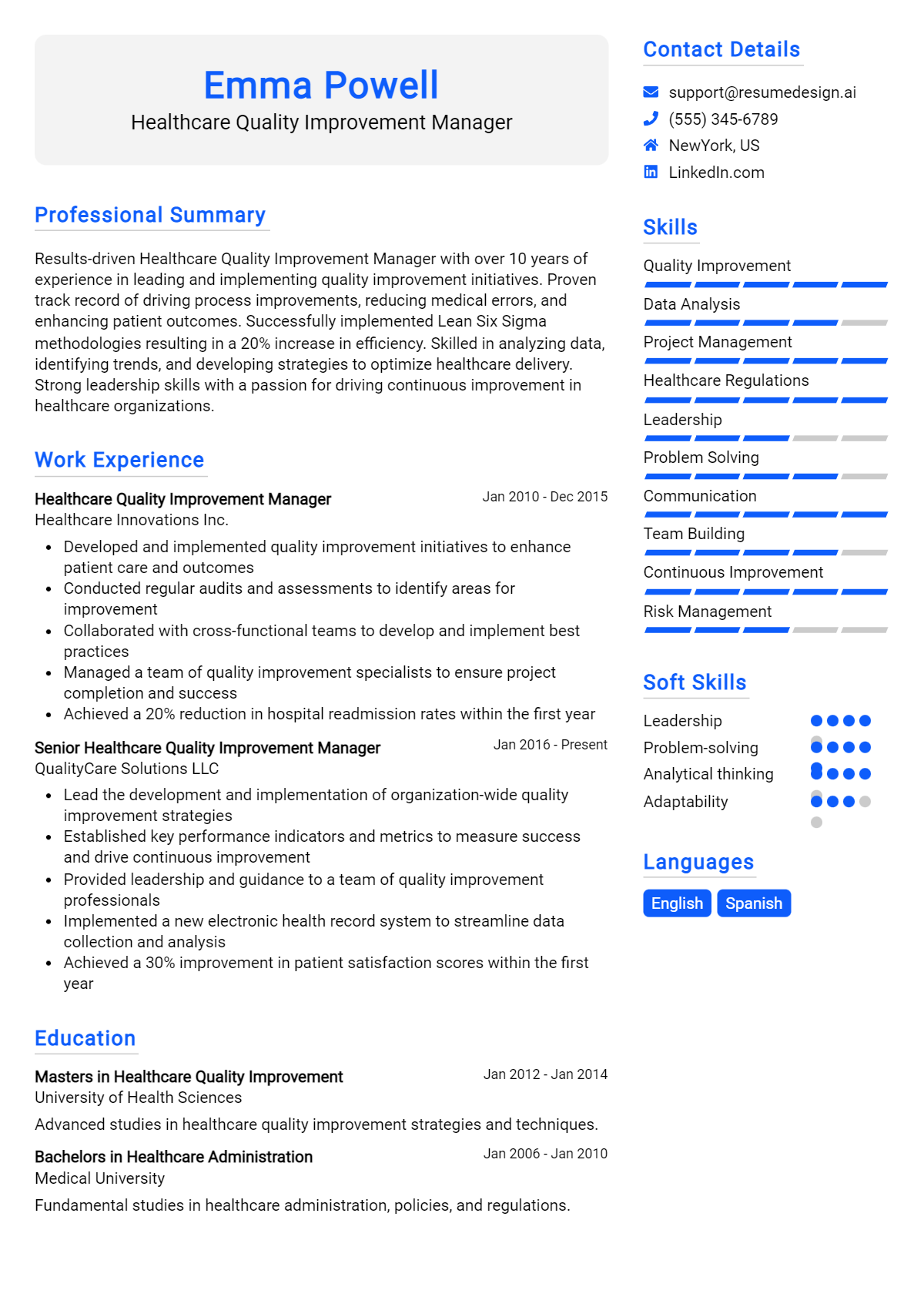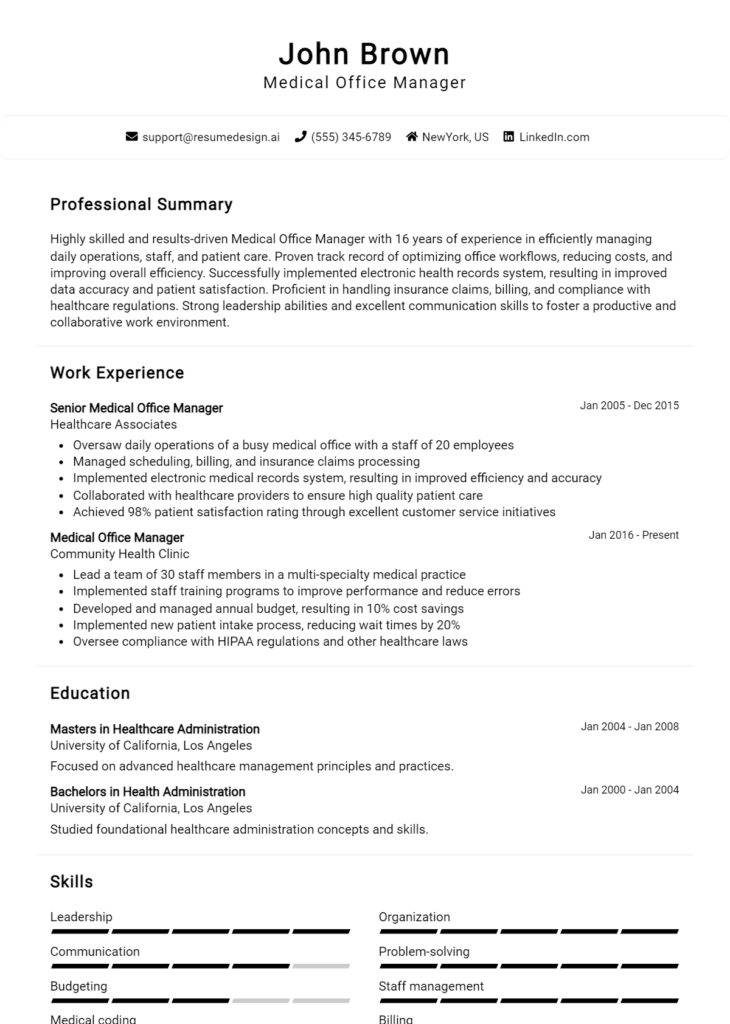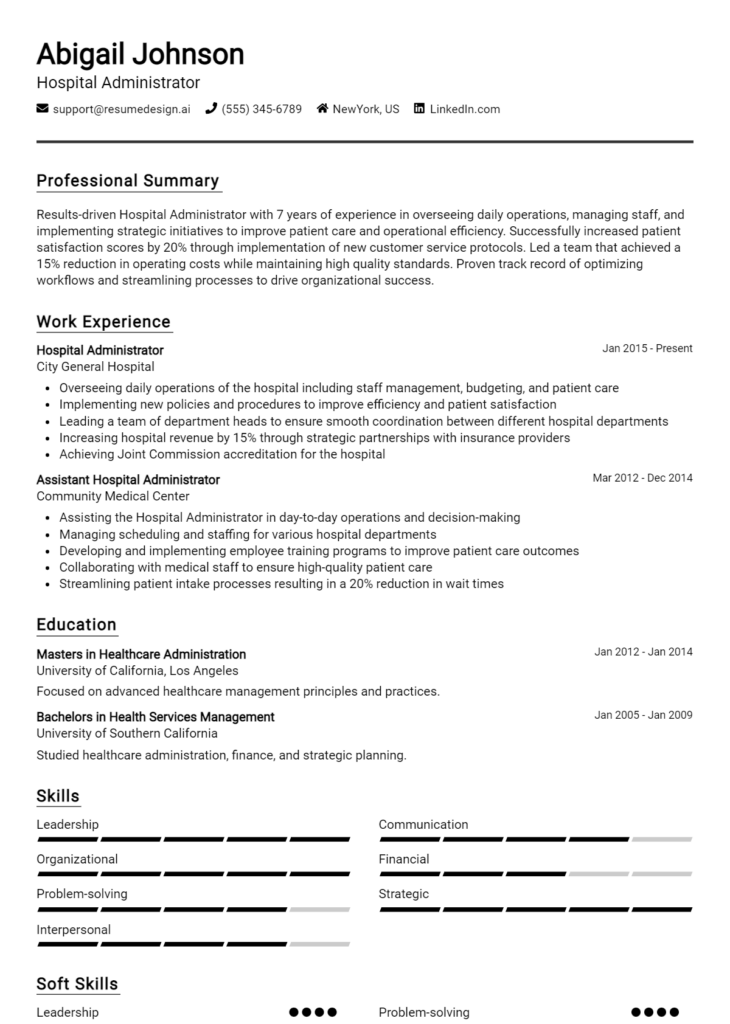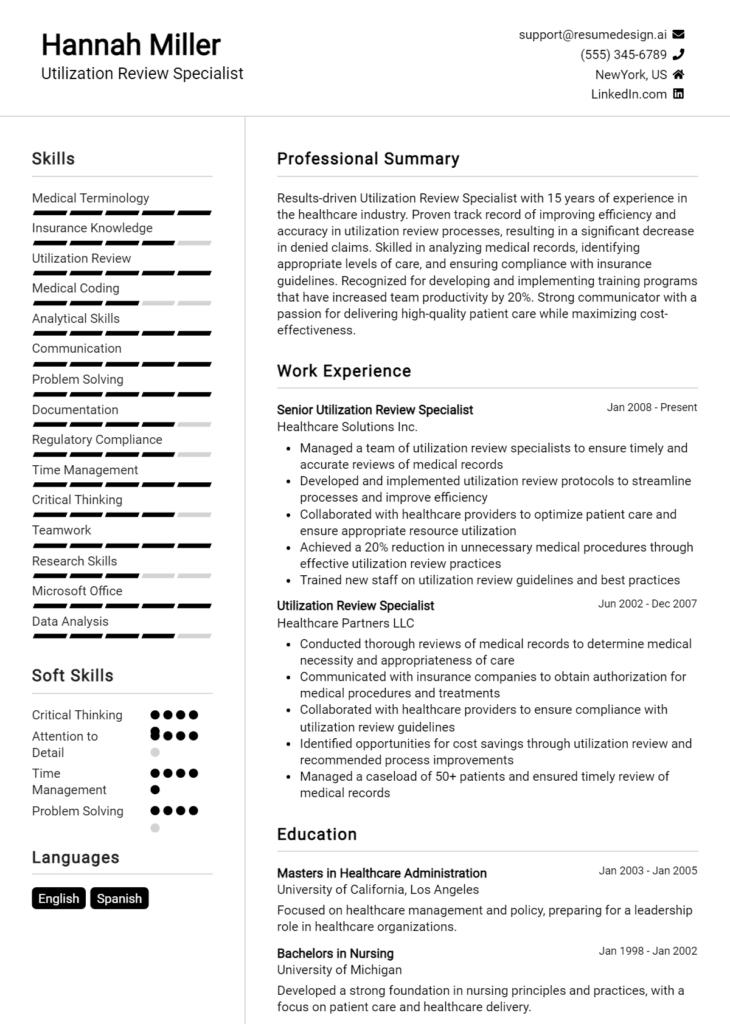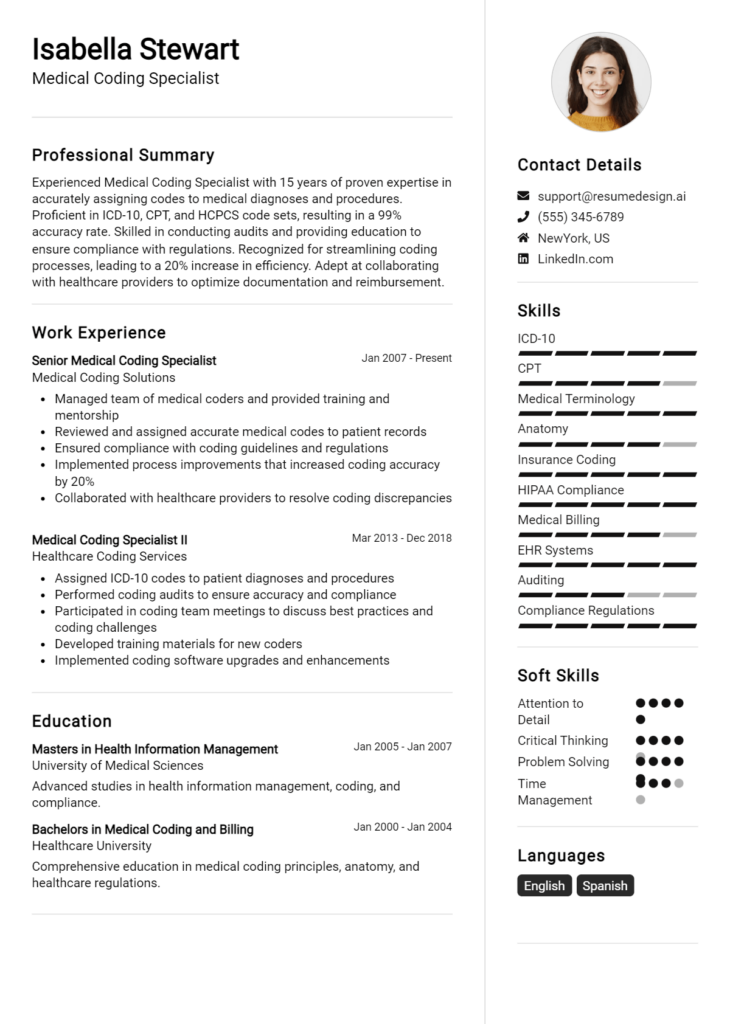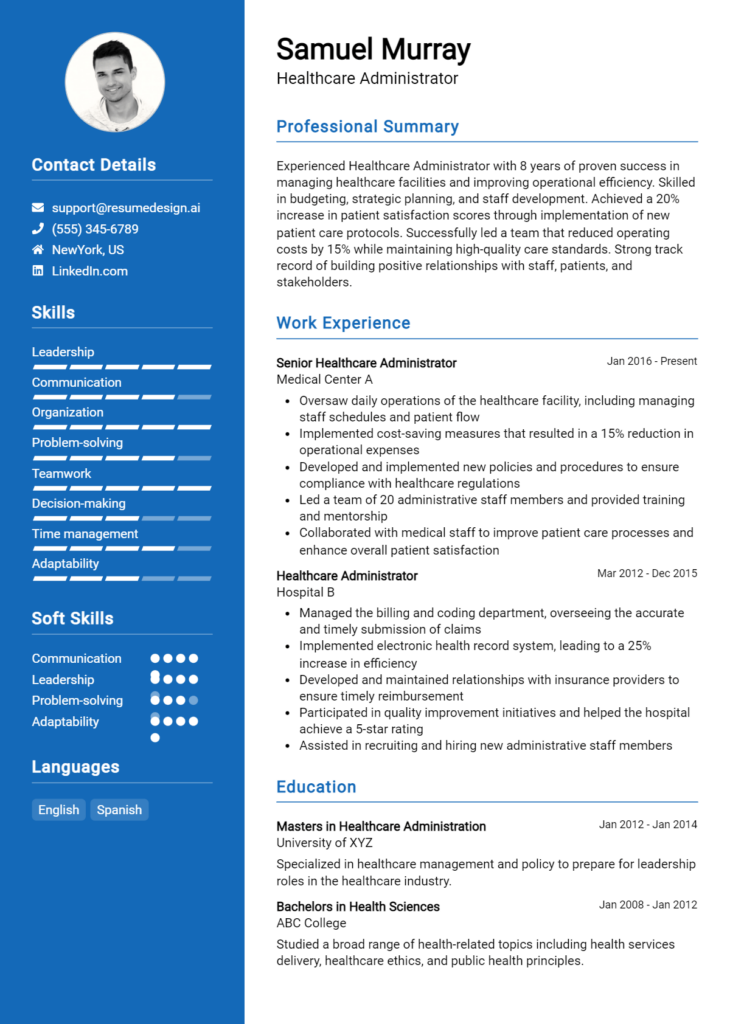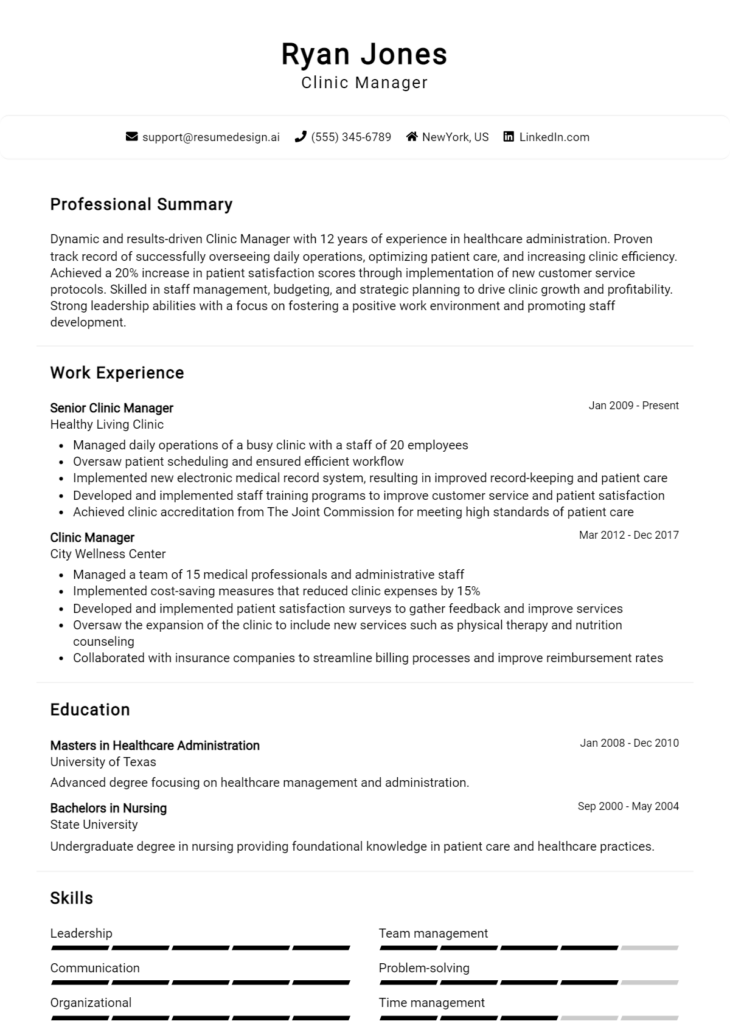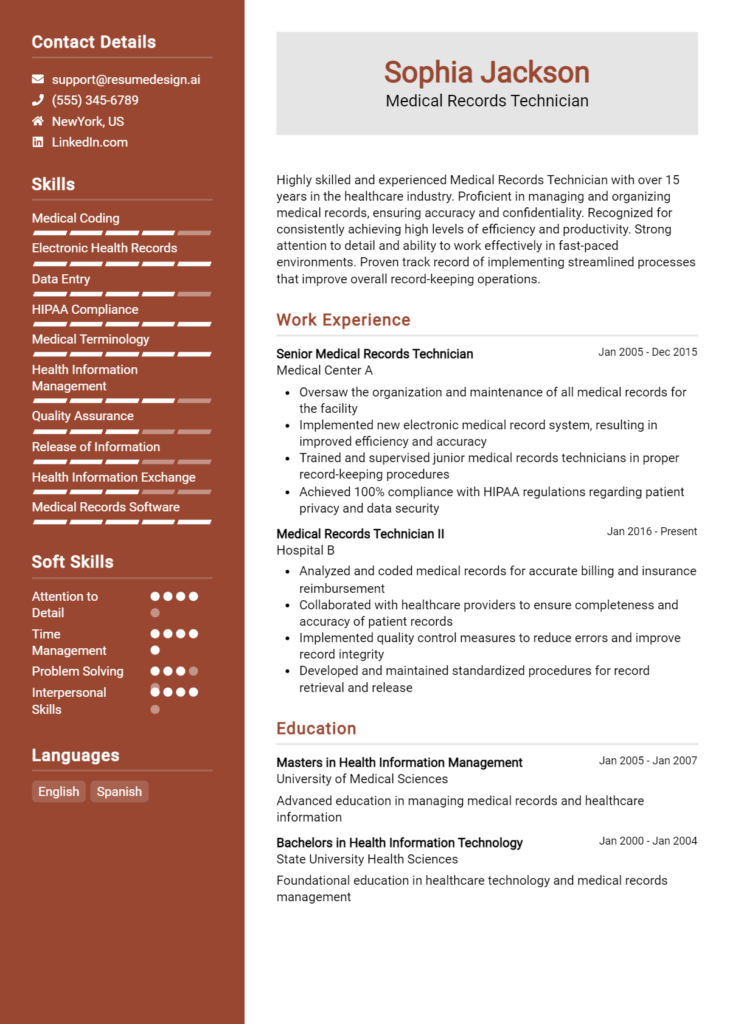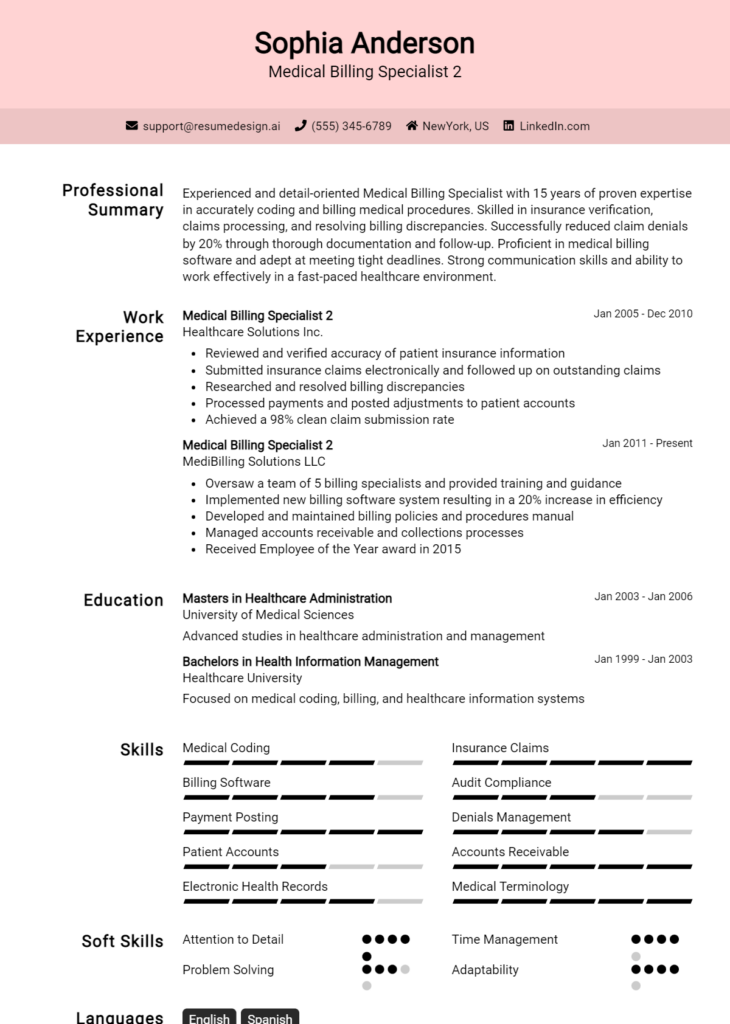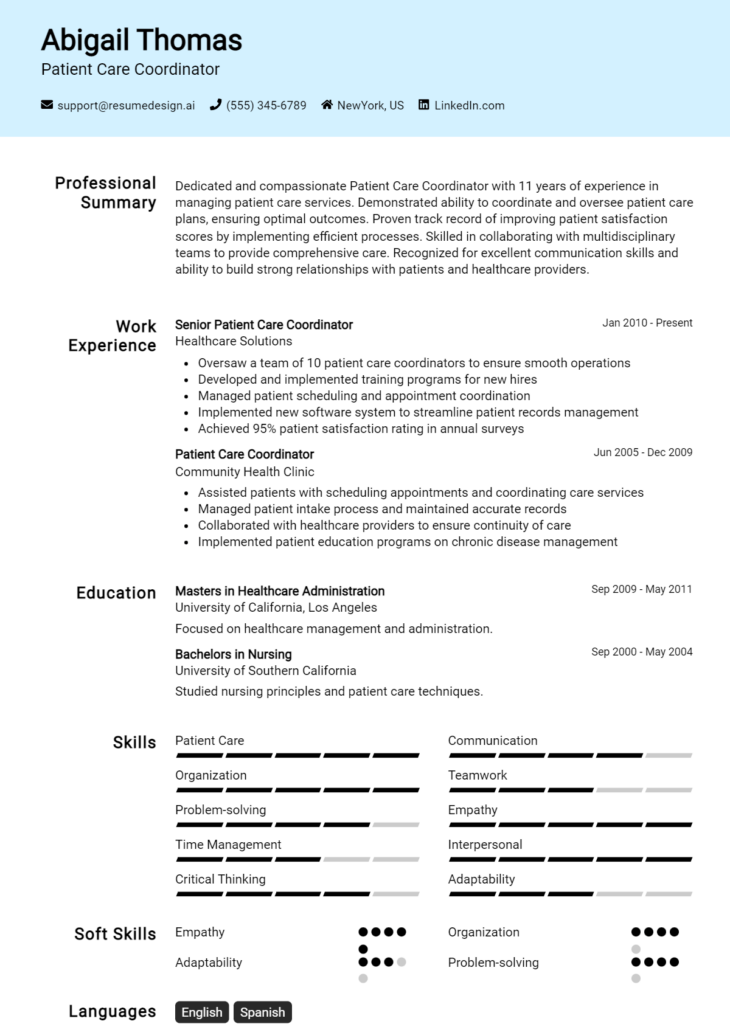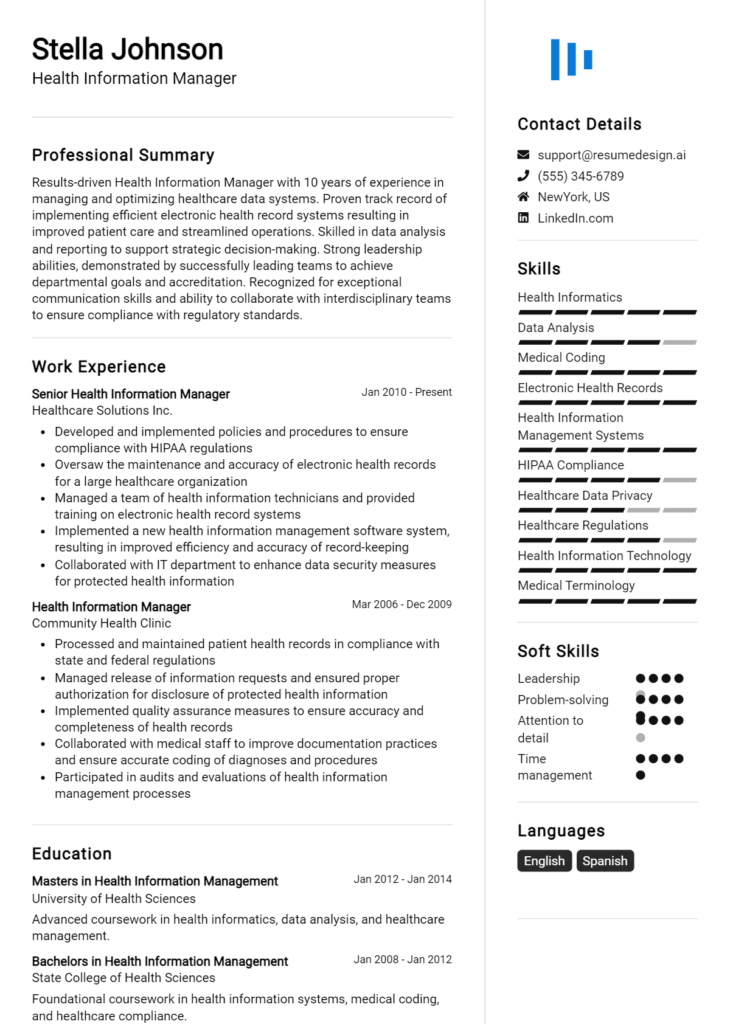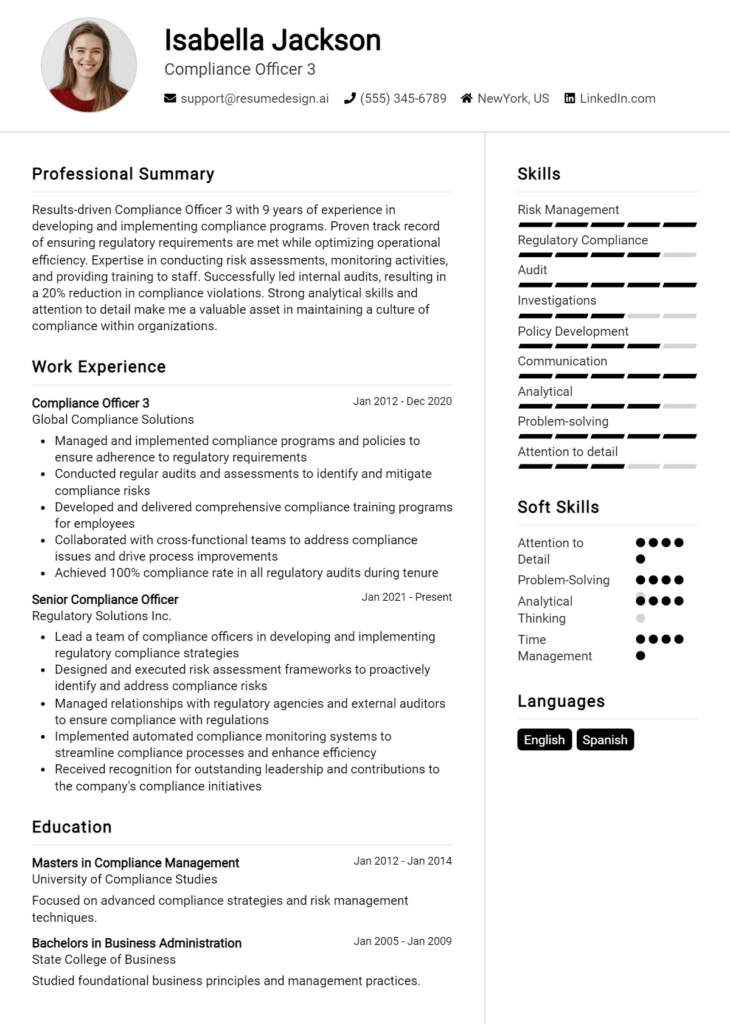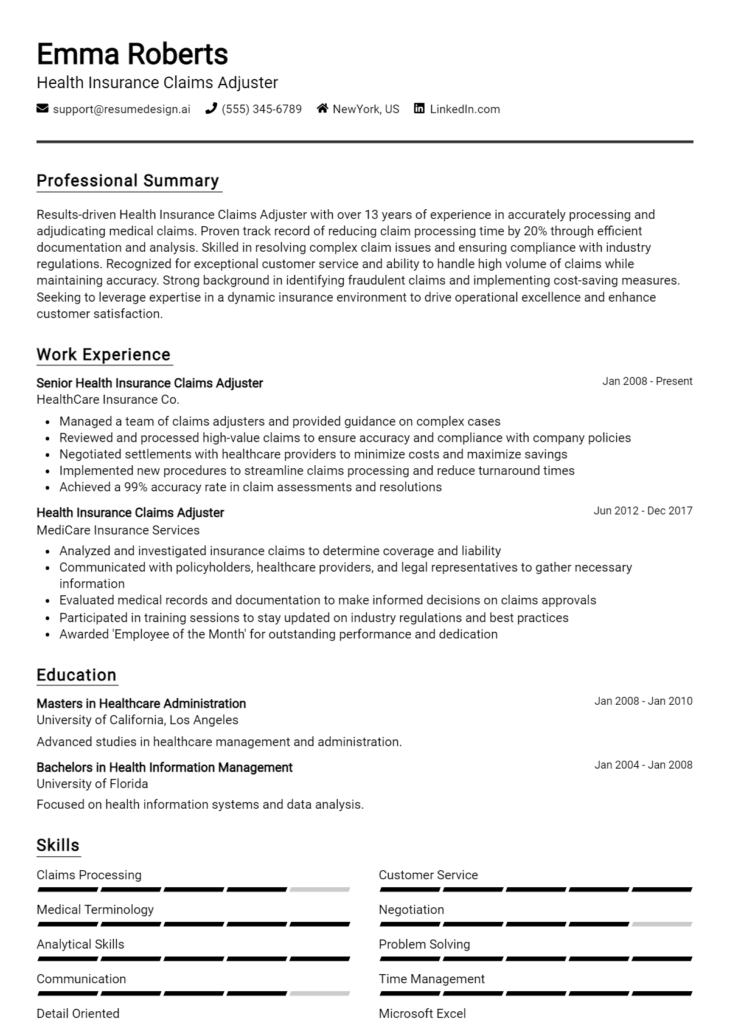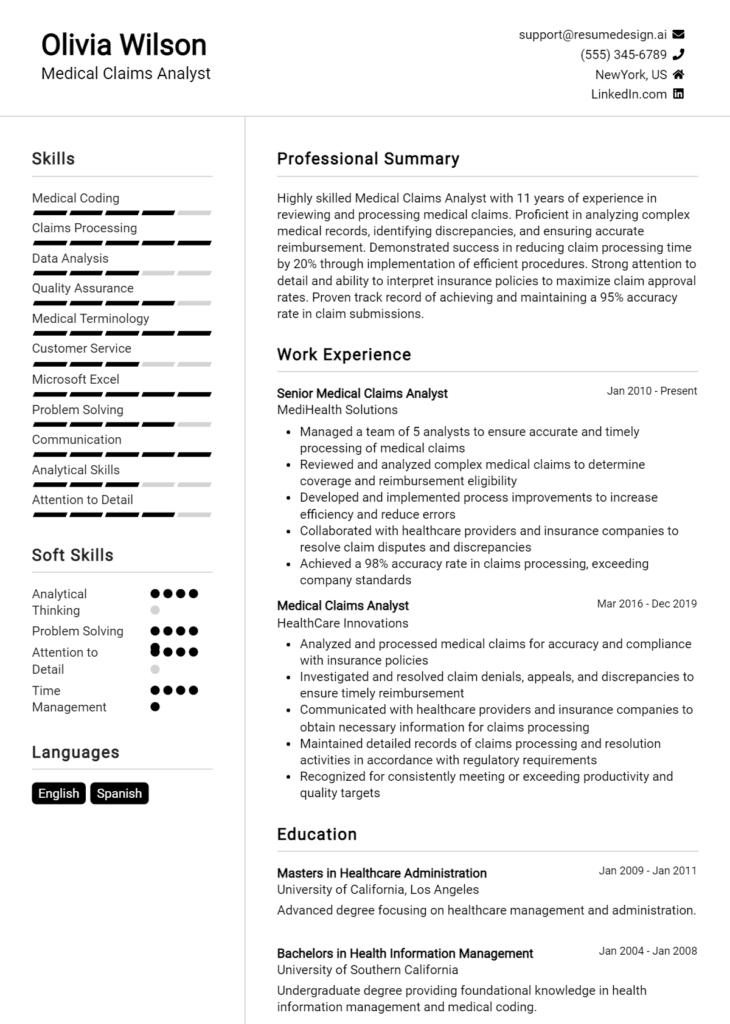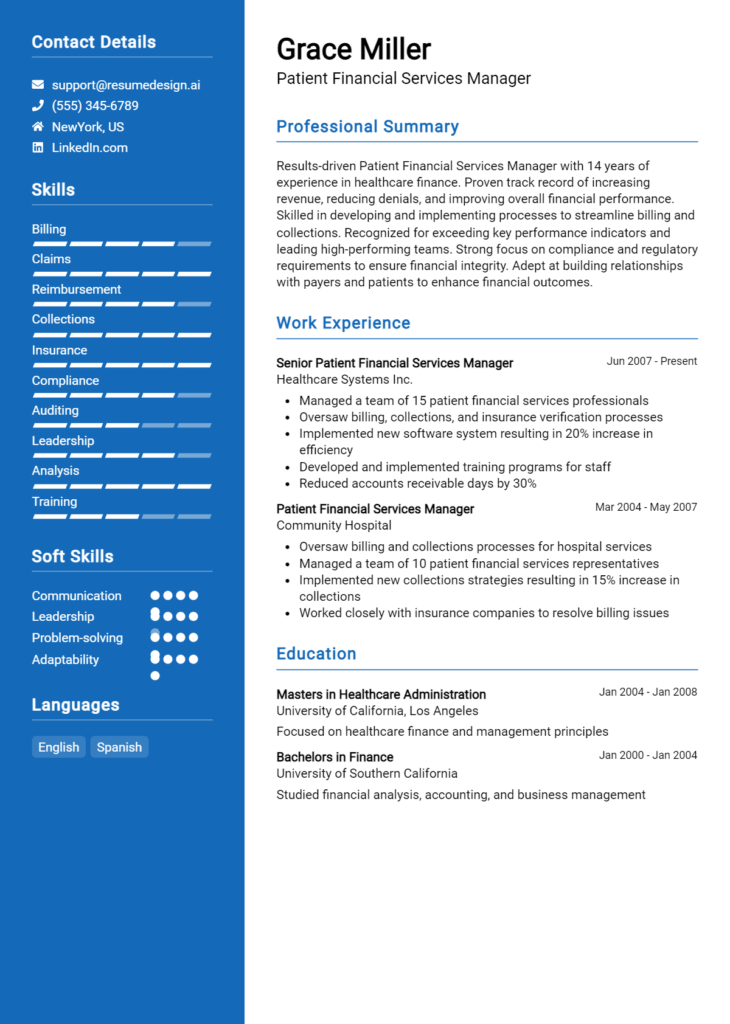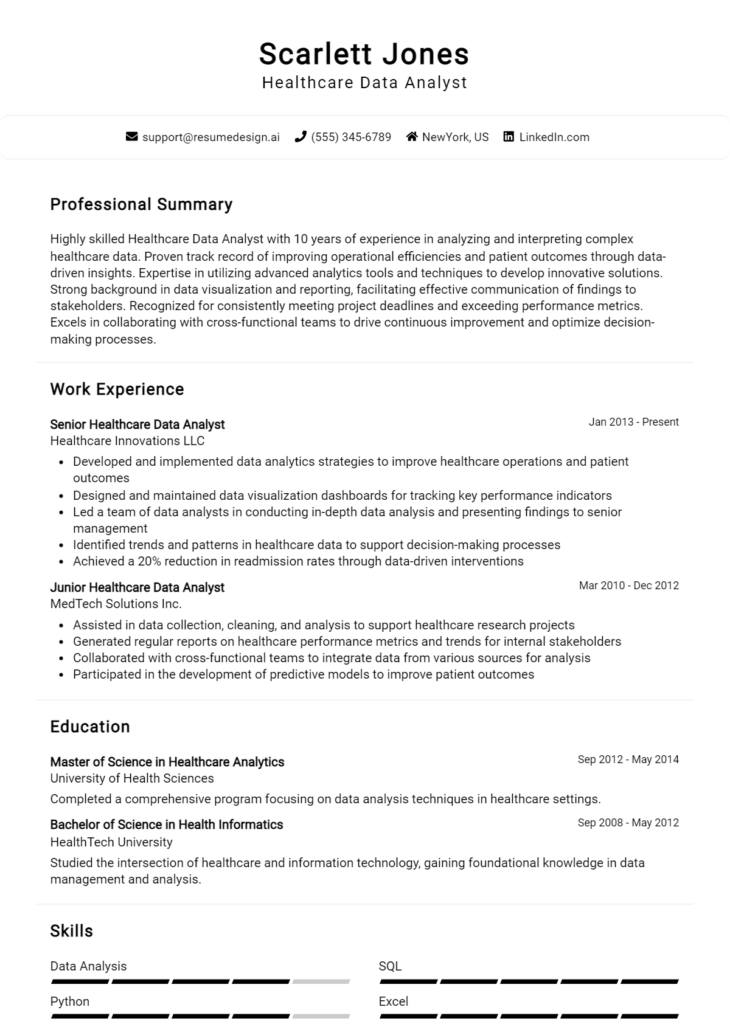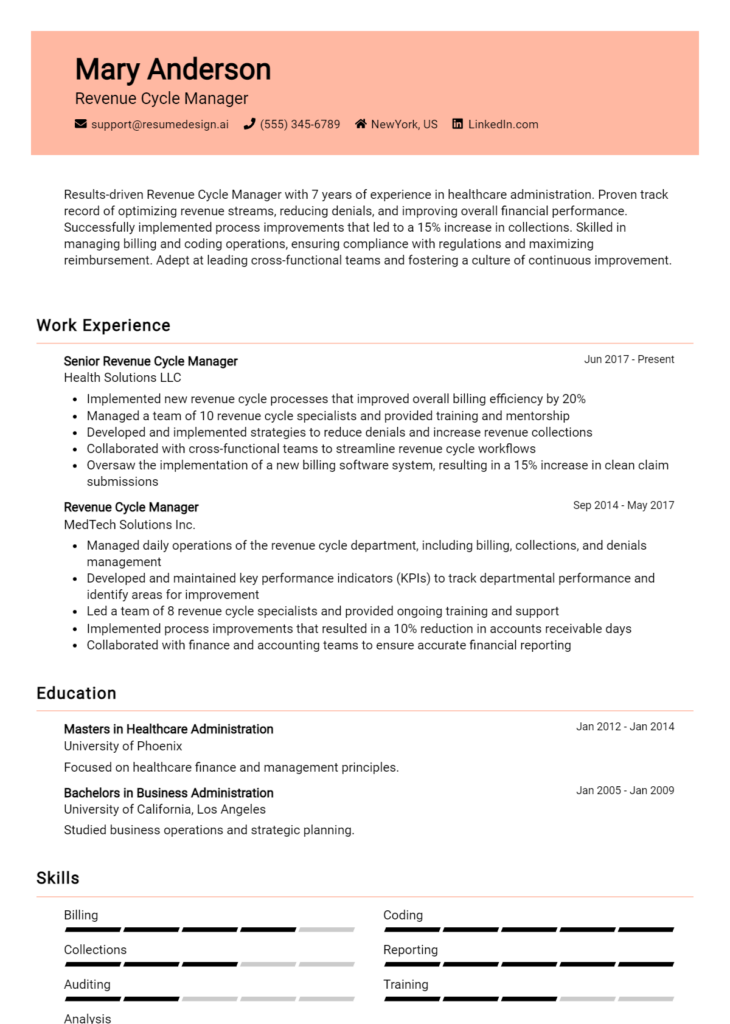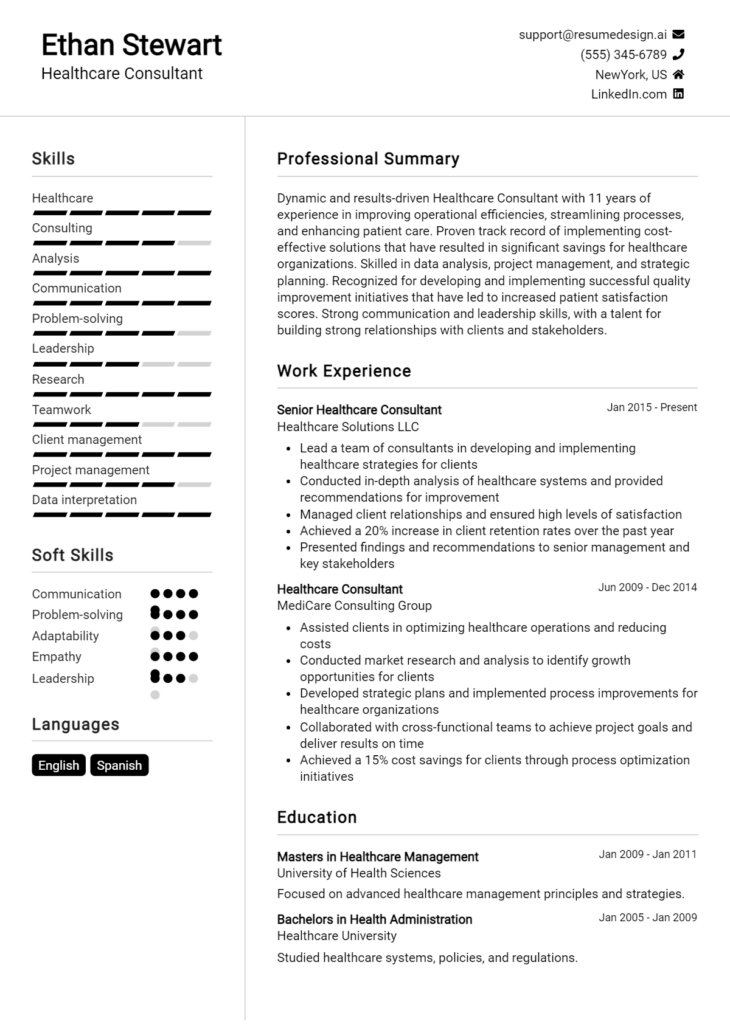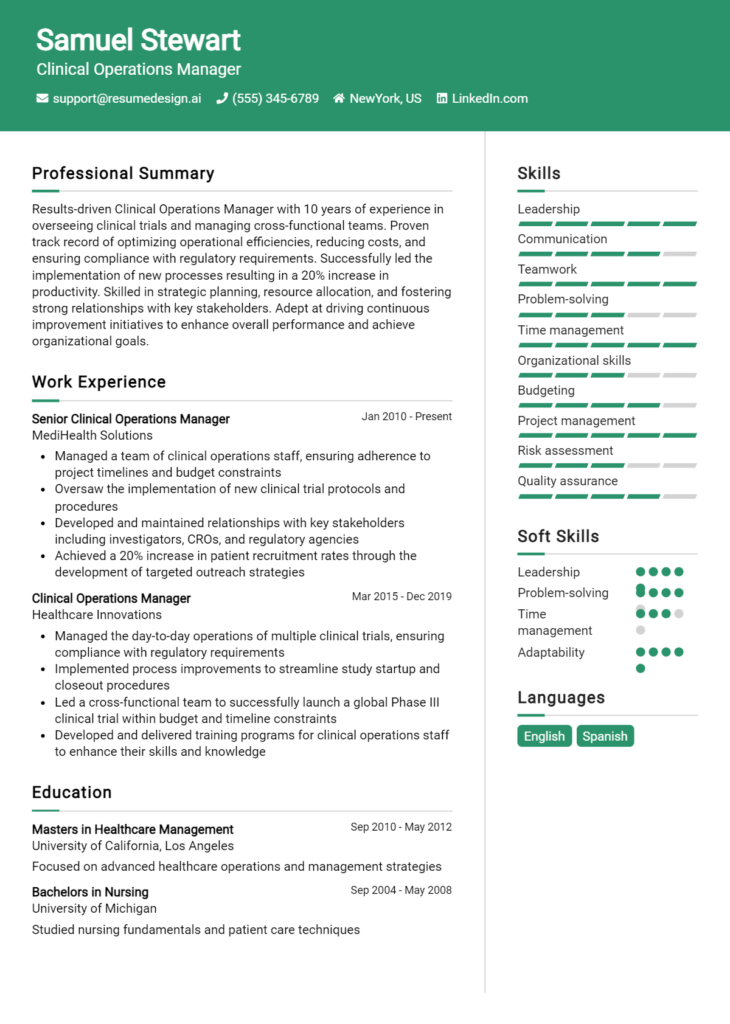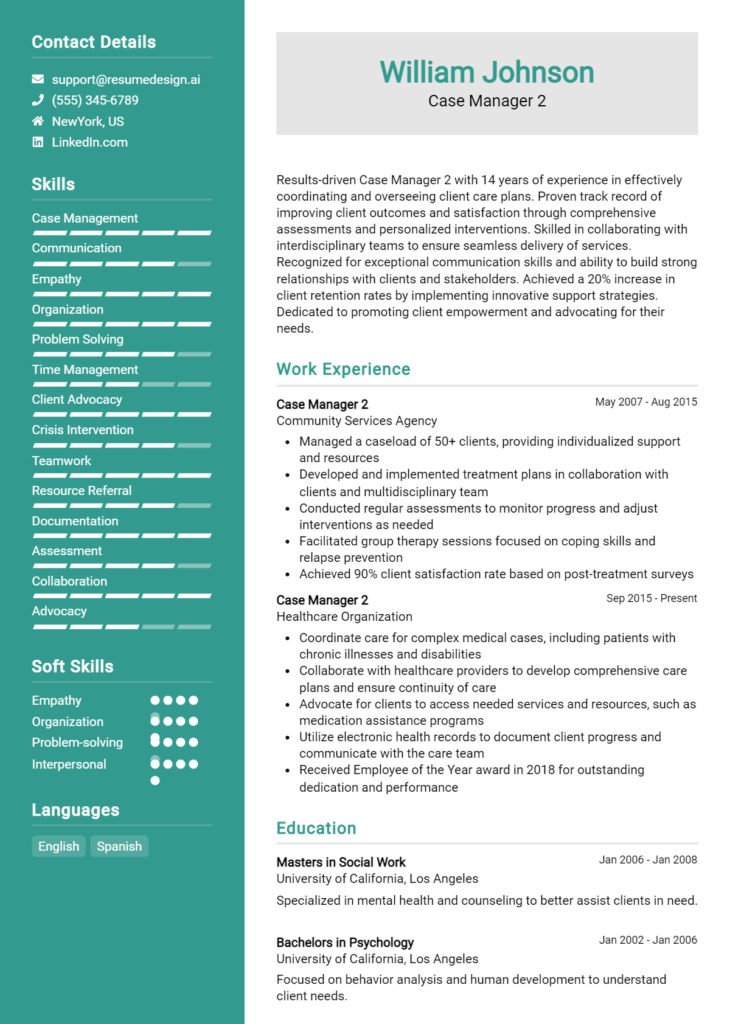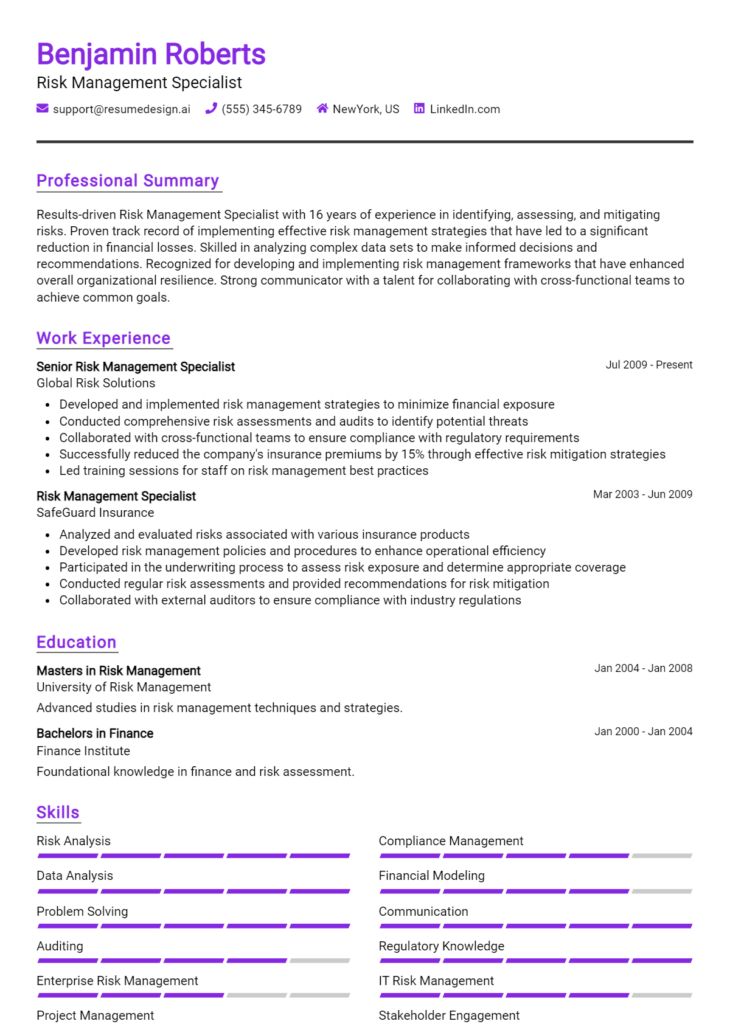Healthcare Quality Improvement Manager Core Responsibilities
A Healthcare Quality Improvement Manager plays a crucial role in enhancing patient care and operational efficiency across various departments. Key responsibilities include assessing quality metrics, leading improvement initiatives, and fostering interdisciplinary collaboration. Strong technical, operational, and problem-solving skills are essential for success, enabling effective data analysis and strategy development. These competencies help align departmental objectives with the organization’s overall goals. A well-structured resume can effectively highlight these qualifications, showcasing the candidate's ability to drive impactful changes.
Common Responsibilities Listed on Healthcare Quality Improvement Manager Resume
- Develop and implement quality improvement programs and strategies.
- Analyze performance data to identify areas for improvement.
- Facilitate training sessions and workshops for staff.
- Collaborate with clinical and administrative teams to enhance patient outcomes.
- Conduct audits and assessments to ensure compliance with regulations.
- Monitor and report on quality indicators and progress.
- Utilize evidence-based practices to inform decision-making.
- Engage stakeholders in quality initiatives and projects.
- Lead root cause analysis for adverse events and implement corrective actions.
- Prepare and present quality improvement reports to leadership.
- Stay updated on healthcare regulations and best practices.
High-Level Resume Tips for Healthcare Quality Improvement Manager Professionals
In the competitive field of healthcare, a well-crafted resume serves as a crucial tool for professionals aspiring to become a Healthcare Quality Improvement Manager. This document often represents the first impression a candidate makes on a potential employer, making it imperative that it effectively showcases both skills and achievements. A strong resume not only highlights the candidate’s qualifications but also demonstrates their commitment to enhancing patient care and operational efficiency. In this guide, we will provide practical and actionable resume tips specifically tailored for Healthcare Quality Improvement Manager professionals, aimed at helping you stand out in a crowded job market.
Top Resume Tips for Healthcare Quality Improvement Manager Professionals
- Tailor your resume to each job description by incorporating relevant keywords and phrases from the posting.
- Highlight your relevant experience in quality improvement initiatives, showcasing specific roles and responsibilities.
- Quantify your achievements with metrics, such as percentage improvements in patient satisfaction or reductions in error rates.
- Emphasize industry-specific skills, such as knowledge of quality improvement methodologies (e.g., Six Sigma, Lean) and healthcare regulations.
- Include certifications relevant to quality improvement, such as Certified Professional in Healthcare Quality (CPHQ) or Lean Six Sigma certification.
- Use action verbs to describe your accomplishments and contributions, making your resume more dynamic and engaging.
- Incorporate a summary statement at the top of your resume that succinctly outlines your professional background and passion for quality improvement.
- Highlight any cross-functional collaboration experiences that demonstrate your ability to work with diverse teams and stakeholders.
- Keep your formatting clean and professional, ensuring that your resume is easy to read and visually appealing.
By implementing these tips, candidates can significantly enhance their resumes, increasing their chances of landing a job in the Healthcare Quality Improvement Manager field. A well-structured and focused resume will not only catch the attention of hiring managers but also clearly communicate your value as a professional dedicated to driving quality and efficiency in healthcare settings.
Why Resume Headlines & Titles are Important for Healthcare Quality Improvement Manager
In the competitive landscape of healthcare, a Healthcare Quality Improvement Manager plays a pivotal role in elevating patient care standards and operational efficiency. An effective resume for this position must feature a compelling headline or title that captures attention quickly and summarizes the candidate’s key qualifications in a concise manner. A strong headline serves as a powerful introduction, allowing hiring managers to immediately assess the candidate's relevance to the role. It should be direct, relevant, and tailored to the specific job being applied for, ensuring it resonates with the expectations of potential employers.
Best Practices for Crafting Resume Headlines for Healthcare Quality Improvement Manager
- Keep it concise: Aim for a headline that is brief but impactful, ideally within 10-12 words.
- Be role-specific: Clearly state the position and area of expertise, such as "Healthcare Quality Improvement Manager."
- Highlight key qualifications: Incorporate specific skills or achievements that set you apart.
- Use industry keywords: Include relevant terminology that aligns with the job description.
- Showcase your results: If possible, mention quantifiable outcomes like “Improved patient satisfaction by 20%.”
- Avoid jargon: Use clear and straightforward language that is easily understood.
- Reflect your brand: Ensure your headline aligns with your professional identity and career goals.
- Tailor for each application: Customize your headline for each job to emphasize the most relevant skills.
Example Resume Headlines for Healthcare Quality Improvement Manager
Strong Resume Headlines
Dynamic Healthcare Quality Improvement Manager with 10+ Years of Experience Driving Patient Safety Initiatives
Results-Oriented Quality Improvement Leader Specializing in Data-Driven Healthcare Solutions
Dedicated Healthcare Quality Manager Committed to Enhancing Patient Outcomes and Operational Efficiency
Weak Resume Headlines
Healthcare Professional Seeking Job
Quality Improvement Manager with Various Skills
Strong headlines are effective because they provide a clear snapshot of the candidate’s expertise and accomplishments, immediately conveying their value to potential employers. They utilize specific language and keywords that resonate with hiring managers, making it easy for them to identify qualified candidates. In contrast, weak headlines tend to be vague and generic, failing to convey any distinct qualifications or strengths. This lack of specificity does not engage the reader and can lead to the candidate being overlooked in favor of more compelling resumes.
Writing an Exceptional Healthcare Quality Improvement Manager Resume Summary
A well-crafted resume summary is essential for a Healthcare Quality Improvement Manager, as it serves as the first impression for hiring managers. This brief yet powerful paragraph quickly captures attention by highlighting key skills, relevant experience, and significant accomplishments that align with the job role. A strong summary not only conveys the candidate's qualifications but also demonstrates their understanding of the healthcare landscape and commitment to quality improvement. It should be concise, impactful, and tailored specifically to the position being applied for, ensuring that it resonates with the hiring team and sets the tone for the rest of the resume.
Best Practices for Writing a Healthcare Quality Improvement Manager Resume Summary
- Quantify achievements with specific metrics to demonstrate impact.
- Highlight relevant skills that align with the job description.
- Tailor the summary to reflect the specific requirements of the position.
- Use action-oriented language to convey proactivity and results.
- Focus on your unique qualifications that differentiate you from other candidates.
- Keep it concise, ideally between 3-5 sentences.
- Incorporate keywords from the job description to enhance compatibility.
- Showcase a commitment to quality improvement and patient safety.
Example Healthcare Quality Improvement Manager Resume Summaries
Strong Resume Summaries
Results-driven Healthcare Quality Improvement Manager with over 10 years of experience in enhancing patient care processes, achieving a 25% reduction in hospital readmission rates. Skilled in Lean Six Sigma methodologies and data analysis, leading cross-functional teams to implement evidence-based practices that improve patient outcomes and operational efficiency.
Dedicated Quality Improvement Manager with a proven track record of improving healthcare delivery systems, successfully increasing patient satisfaction scores by 30% within two years. Expertise in regulatory compliance, clinical performance improvement, and fostering a culture of quality across multidisciplinary teams.
Innovative Healthcare Quality Improvement Manager with a focus on patient-centered care, successfully leading initiatives that resulted in a 40% decrease in medication errors. Experienced in utilizing quality metrics and patient feedback to drive continuous improvement and enhance clinical outcomes.
Weak Resume Summaries
Experienced manager in healthcare quality improvement. I have worked on various projects and have some skills in data analysis.
Quality Improvement Manager with experience in healthcare. I am looking for opportunities to make improvements in patient care.
The strong resume summaries effectively demonstrate quantifiable outcomes, specific skills, and a direct relevance to the Healthcare Quality Improvement Manager role. They present concrete achievements and a clear understanding of industry standards. In contrast, the weak summaries are vague, lacking specific details and measurable results, making it difficult for hiring managers to gauge the candidate's qualifications and impact in previous roles.
Work Experience Section for Healthcare Quality Improvement Manager Resume
The work experience section in a Healthcare Quality Improvement Manager resume is crucial as it serves as a showcase for the candidate's technical skills, team management abilities, and their capacity to deliver high-quality outcomes in healthcare settings. This section allows prospective employers to gauge the candidate’s expertise in quality improvement initiatives, understanding of regulatory compliance, and experience with data analysis. Quantifying achievements, such as improved patient outcomes or enhanced operational efficiencies, is essential to demonstrate impact and effectiveness. Additionally, aligning experiences with industry standards helps to establish credibility and relevance in the field of healthcare quality management.
Best Practices for Healthcare Quality Improvement Manager Work Experience
- Highlight specific technical skills relevant to quality improvement methodologies, such as Lean, Six Sigma, or Plan-Do-Study-Act (PDSA) cycles.
- Quantify achievements with metrics and KPIs to illustrate the impact of your work, such as percentage improvements in patient satisfaction or reductions in readmission rates.
- Emphasize leadership roles and the ability to manage and mentor teams effectively in quality initiatives.
- Provide examples of cross-functional collaboration with clinical and administrative teams to drive quality improvements.
- Showcase experience with regulatory compliance and accreditation processes, detailing specific standards met or exceeded.
- Include continuous education or certifications that reinforce your commitment to quality improvement in healthcare.
- Use action verbs to depict your contributions and responsibilities clearly and dynamically.
- Align your experiences with current healthcare trends and challenges to demonstrate relevance and foresight.
Example Work Experiences for Healthcare Quality Improvement Manager
Strong Experiences
- Led a quality improvement project that resulted in a 30% decrease in hospital readmission rates over 12 months, enhancing patient outcomes and operational efficiency.
- Implemented a Lean management approach across the surgical department, which improved process turnaround time by 25% and reduced waste by 15%.
- Facilitated interdisciplinary team workshops that engaged over 50 staff members, resulting in a 40% increase in employee satisfaction scores related to quality initiatives.
- Enhanced regulatory compliance by successfully guiding the organization through joint commission accreditation, achieving a score of 98%.
Weak Experiences
- Worked on various quality improvement projects.
- Assisted in team meetings to discuss healthcare quality issues.
- Helped with data collection for quality assessments.
- Participated in training sessions related to quality improvement.
The examples categorized as strong are characterized by their specificity and quantifiable results, demonstrating the candidate's leadership and effective collaboration within teams. These experiences clearly articulate the tangible impact the candidate has made in their roles. Conversely, the weak experiences lack detail and measurable outcomes, making them less compelling and failing to illustrate the candidate's contributions to quality improvement efforts in healthcare.
Education and Certifications Section for Healthcare Quality Improvement Manager Resume
The education and certifications section in a Healthcare Quality Improvement Manager resume is crucial for demonstrating the candidate's academic qualifications and commitment to professional growth. This section not only showcases relevant degrees and industry-recognized certifications but also reflects the candidate's dedication to continuous learning in the rapidly evolving healthcare landscape. By including pertinent coursework, specialized training, and certifications that align with quality improvement principles, candidates can significantly enhance their credibility and showcase their suitability for the role.
Best Practices for Healthcare Quality Improvement Manager Education and Certifications
- Prioritize relevant degrees such as a Master's in Public Health, Healthcare Administration, or a related field.
- List industry-recognized certifications, such as Certified Professional in Healthcare Quality (CPHQ) or Lean Six Sigma Green Belt.
- Include specific coursework that directly relates to quality improvement methodologies and healthcare systems.
- Highlight any specialized training in quality management, patient safety, or data analysis.
- Keep the formatting consistent and easy to read, using bullet points for clarity.
- Include the date of completion for certifications to indicate currency and relevance.
- Consider mentioning any ongoing education or professional development activities.
- Tailor the education and certifications section to align with the specific job description and requirements.
Example Education and Certifications for Healthcare Quality Improvement Manager
Strong Examples
- Master of Health Administration (MHA) – University of Health Sciences, 2022
- Certified Professional in Healthcare Quality (CPHQ) – National Association for Healthcare Quality, 2021
- Lean Six Sigma Green Belt Certification – American Society for Quality, 2020
- Coursework in Healthcare Quality Improvement and Patient Safety – Online Certification Program, 2023
Weak Examples
- Bachelor's Degree in Fine Arts – University of the Arts, 2015
- Outdated certification in Medical Billing and Coding – Completed in 2010
- High School Diploma – Graduated 2008
- Certification in Computer Programming – Not relevant to healthcare quality improvement, 2012
The strong examples are considered effective because they directly relate to the healthcare quality improvement field, showcasing relevant degrees and current certifications that demonstrate expertise and a commitment to the field. In contrast, the weak examples illustrate qualifications that lack relevance to the healthcare quality improvement role, such as degrees and certifications that do not align with the necessary skills and knowledge for this position. Focusing on strong, relevant educational credentials enhances a candidate's profile and positions them as a suitable fit for the role.
Top Skills & Keywords for Healthcare Quality Improvement Manager Resume
In the competitive field of healthcare, the role of a Quality Improvement Manager is crucial for enhancing patient care and operational efficiency. A well-crafted resume that highlights relevant skills can significantly boost a candidate's chances of securing an interview. Employers are keen to see a blend of both hard and soft skills that demonstrate the applicant's ability to lead quality improvement initiatives, analyze data, and foster a culture of continuous improvement. By effectively showcasing these skills, candidates can present themselves as well-rounded professionals ready to make a positive impact in healthcare settings.
Top Hard & Soft Skills for Healthcare Quality Improvement Manager
Soft Skills
- Leadership
- Communication
- Problem-solving
- Adaptability
- Team Collaboration
- Conflict Resolution
- Critical Thinking
- Emotional Intelligence
- Time Management
- Attention to Detail
- Project Management
- Interpersonal Skills
- Motivational Skills
- Active Listening
- Decision Making
Hard Skills
- Quality Improvement Methodologies (e.g., Six Sigma, Lean)
- Data Analysis and Interpretation
- Regulatory Compliance Knowledge
- Performance Measurement
- Healthcare Statistics
- Risk Management
- Process Mapping
- Patient Safety Initiatives
- Electronic Health Records (EHR) Proficiency
- Audit and Assessment Techniques
- Training and Development
- Statistical Software (e.g., SPSS, SAS)
- Root Cause Analysis
- Benchmarking and Best Practices
- Workflow Optimization
- Reporting and Documentation
- Understanding of Clinical Guidelines
For more insights on essential skills, check out the skills section. Additionally, showcasing relevant work experience will further strengthen your resume and demonstrate your qualifications for the role.
Stand Out with a Winning Healthcare Quality Improvement Manager Cover Letter
I am excited to apply for the Healthcare Quality Improvement Manager position at [Company Name]. With over [X years] of experience in healthcare quality management and a proven track record of driving significant improvements in patient care outcomes, I am confident in my ability to contribute effectively to your team. My background in data analysis, project management, and team leadership has equipped me with the skills necessary to implement successful quality improvement initiatives that align with organizational goals and enhance patient satisfaction.
In my previous role at [Previous Company Name], I led a multidisciplinary team to develop and execute a quality improvement plan that resulted in a [specific percentage] decrease in patient readmission rates over [time period]. By utilizing key performance indicators and conducting thorough root cause analyses, we were able to identify critical areas for improvement and implement evidence-based strategies. Additionally, I fostered a culture of continuous improvement by training staff on best practices and encouraging open communication among departments, ultimately improving both team morale and patient care delivery.
I am particularly drawn to [Company Name] because of your commitment to innovation and excellence in healthcare services. I admire your focus on patient-centered care and believe that my expertise in quality improvement aligns perfectly with your mission. I am eager to bring my skills in data-driven decision-making and stakeholder engagement to your organization, ensuring that we not only meet but exceed quality benchmarks and enhance the overall patient experience.
Thank you for considering my application. I look forward to the opportunity to discuss how my experience and vision for quality improvement can contribute to the continued success of [Company Name]. I am excited about the possibility of working together to create a healthcare environment that prioritizes safety, quality, and patient satisfaction.
Common Mistakes to Avoid in a Healthcare Quality Improvement Manager Resume
Crafting a resume for a Healthcare Quality Improvement Manager position requires attention to detail and an understanding of the specific skills and experiences that are relevant to the role. Many applicants make critical errors that can hinder their chances of securing an interview. Avoiding these common mistakes can help you present a more compelling and professional resume that stands out to potential employers.
Lack of Relevant Experience: Failing to highlight specific experience in healthcare quality improvement can lead to a resume that appears generic. Tailor your experience to focus on roles that involved quality management, patient safety, or process improvement.
Neglecting Quantifiable Achievements: Simply listing responsibilities without showcasing measurable outcomes can diminish the impact of your contributions. Use metrics and statistics to illustrate how your efforts led to improvements in patient care, efficiency, or satisfaction.
Using Jargon Without Explanation: While industry terminology is important, overloading your resume with jargon can confuse hiring managers. Ensure that you explain any specialized terms or acronyms to make your qualifications clear to a broader audience.
Ignoring Soft Skills: A successful Healthcare Quality Improvement Manager must possess strong interpersonal skills. Omitting these qualities can make your resume feel one-dimensional. Include examples of teamwork, communication, and leadership in your experience.
Formatting Issues: A cluttered or inconsistent format can detract from the professionalism of your resume. Use clear headings, bullet points, and a consistent font to enhance readability and presentation.
Lack of Customization: Submitting a generic resume for multiple positions is a missed opportunity. Tailor your resume to each specific job by incorporating keywords from the job description and aligning your experiences with the employer's needs.
Overlooking Continuing Education: In a field that continually evolves, failing to mention ongoing education or certifications can signal a lack of commitment to professional growth. Highlight any relevant courses, workshops, or certifications that enhance your qualifications.
Not Including a Summary Statement: A resume without a summary or objective statement may lack direction. A concise summary at the top of your resume can provide a snapshot of your qualifications and career goals, drawing the reader in and making a strong first impression.
Conclusion
In summary, the role of a Healthcare Quality Improvement Manager is pivotal in enhancing patient care and operational efficiency within healthcare organizations. Key responsibilities include analyzing data to identify areas for improvement, implementing quality improvement initiatives, and ensuring compliance with regulatory standards. The position requires a blend of analytical skills, strong leadership, and an in-depth understanding of healthcare processes.
As the healthcare landscape continues to evolve, so does the demand for skilled professionals ready to lead quality improvement efforts. If you're aiming for a position as a Healthcare Quality Improvement Manager or seeking to advance your career in this field, it's essential to have a polished resume that effectively showcases your qualifications and achievements.
We encourage you to take a moment to review your resume and ensure it aligns with the demands of this critical role. To assist you in this process, consider utilizing available resources such as resume templates, which can provide a professional format to highlight your expertise. Additionally, a resume builder can help streamline the creation of your resume, while resume examples offer inspiration for showcasing your unique skills. Don't forget to complement your resume with a well-crafted cover letter using our cover letter templates to make a compelling case for your candidacy.
Take action today to enhance your application materials and position yourself as a strong candidate in the competitive field of healthcare quality improvement!

